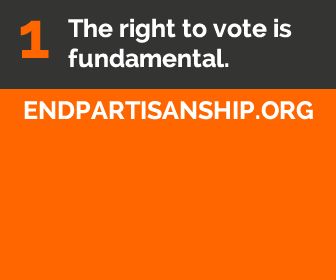Texans Paid $13 Million on Tuesday to Elect Candidates for Private Organizations

News analysts saw the contests in the Lone Star State as early referenda on the future of the Republican Party, with Democrats like gubernatorial nominee Wendy Davis likely to face an uphill battle come November. USA Today billed the nominations as ones that will “test the strength of the conservative Tea Party movement in one of the nation’s reddest states.”
Less known is how voters who trend independent factored into the state’s primary season, but analysis by the Independent Voter Network suggests their voice was confined to the tents of the two major parties — and that taxpayers once again footed the bill for it this year.
For a state that prizes its unique history, Texas remains — like many others — a state that finances primary elections for the candidates of private, tax-exempt organizations with taxpayer funds.
Texas leaves administration and management of the private elections to county clerks and precinct chairs. The state constitution charges the secretary of state with interpreting and upholding primary election law, giving the agency broad discretion in finance and supervision.County clerks are responsible for managing private election operations, poll workers, and the sensitive logistics of operations held for public purposes.
Rather than pay directly for these election services, Texas reimburses up to 75 percent of the costs after the elections are held. This follows final cost reports that the clerks must file after the elections in order to be eligible for reimbursements.
The Texas government does this in an open primary system — albeit one in a political, legal, and financial culture that overwhelmingly favors the Democratic and Republican parties. Many independent and unaffiliated third-party voters likely took advantage of the access this system grants on Tuesday, but had to vote for candidates from only one of the predominant parties.
This means that — at least indirectly — Texas taxpayers subsidize two-thirds of the election expenses for organizations that the state treats as private, tax-exempt political action committees. With independent voters forced to side with one of the two parties on their ballots, it also undermines the right of non-affiliation guaranteed by the Constitution — with public funds.
Just how much did Texas taxpayers front for elections used to weed out and promote candidates for their state’s Democratic and Republican parties on Tuesday?
A look at the state Legislature’s most recent appropriations act revealed that public officials voted to allocate nearly $30 million to the Texas secretary of state for its five-goal public administration strategy for 2014 and 2015.
(The Texas Legislature has set and approved budgets for the agency in past cycles that allow for unexpended balances over a two-year period.)
Of that $30 million, nearly $13 million was earmarked for the secretary of state to administer primary elections for the state’s two major parties and reimburse postage for voter registration activities. More than $110,00 was allowed to carry over into 2015 for the same purposes.
According to materials obtained by the Independent Voter Network, county clerks and other low-level officials who ran Tuesday’s primaries will see a little more than $12 million in grants from the secretary of state—nearly all of that allocation.
This is an uptick from the more than $12 million and roughly $1.5 million made in reimbursements to county and precinct officials over fiscal years 2012 and 2013, respectively. A spokesperson with the Texas secretary of state did not immediately return a request for comment on the increase from past years.
Broken down, most of the funds reimburse county clerks for their roles in primary election and administration. The rest often goes to salaries for poll workers, travel expenses, and other less-than-clear areas left to the discretion of the Texas secretary of state’s elections division.
For 2014, the Texas Legislative Budget Board — the nonpartisan state agency that works with lawmakers to prepare budgets —estimated in analysis released Monday that the secretary of state would spend roughly $8 million of that allocation on primary-election expenses, with about $2.8 million on hand for primary runoffs.
Like their affiliates across the country, the Democratic and Republican parties of Texas are tax-exempt private entities with highly public roles and responsibilities. Taxpayer-funded compensation for primary election expenses only muddies the water of their operations even further.
Even so, sources say that — even in a post-Citizens United environment — the two parties are nonetheless prohibited from using corporate or union funds for their primaries.
Spokespeople with the Democratic and Republican Parties of Texas did not immediately return requests for comment.
What is clear is that Texas taxpayers paid for Tuesday’s primary elections, effectively making the Lone Star State a public sponsor for the two private political parties. And, nothing could probably be further from a mostly red state’s idea of a free market sans government assistance.
Photo Credit: Callie Richmond / The Texas Tribune






